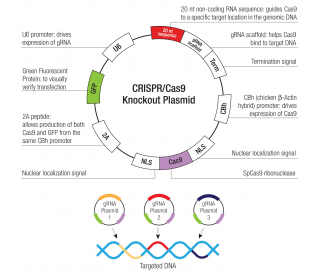Purity
>90%, by SDS-PAGE under reducing conditions and visualized by silver stain
Endotoxin Level
<1.0 EU per 1 μg of the protein by the LAL method.
Activity
Measured by its ability to inhibit proliferation of HeLa human cervical epithelial carcinoma cells. The ED 50 for this effect is 2-6 µg/mL.
Source
Mouse myeloma cell line, NS0-derived Leu21-Leu230, with a C-terminal 10-His tag
Accession #
N-terminal Sequence
AnalysisLeu21
Structure / Form
monomer
Predicted Molecular Mass
26.8 kDa
SDS-PAGE
40 kDa, reducing conditions
Carrier Free
What does CF mean?
CF stands for Carrier Free (CF). We typically add Bovine Serum Albumin (BSA) as a carrier protein to our recombinant proteins. Adding a carrier protein enhances protein stability, increases shelf-life, and allows the recombinant protein to be stored at a more dilute concentration. The carrier free version does not contain BSA.
What formulation is right for me?
In general, we advise purchasing the recombinant protein with BSA for use in cell or tissue culture, or as an ELISA standard. In contrast, the carrier free protein is recommended for applications, in which the presence of BSA could interfere.
1508-S1/CF |
| 1508-S1 |
Formulation Lyophilized from a 0.2 μm filtered solution in PBS. | Formulation Lyophilized from a 0.2 μm filtered solution in PBS with BSA as a carrier protein. | |
Reconstitution Reconstitute at 100 μg/mL in sterile PBS. | Reconstitution Reconstitute at 100 μg/mL in sterile PBS containing at least 0.1% human or bovine serum albumin. | |
Shipping The product is shipped at ambient temperature. Upon receipt, store it immediately at the temperature recommended below. | Shipping The product is shipped at ambient temperature. Upon receipt, store it immediately at the temperature recommended below. | |
Stability & Storage: Use a manual defrost freezer and avoid repeated freeze-thaw cycles.
| Stability & Storage: Use a manual defrost freezer and avoid repeated freeze-thaw cycles.
|
Background: Soggy-1/DkkL1
Soggy-1, also known as DkkL1 (Dickkopf-like 1), is a secreted protein that is related to the Dickkopf family of Wnt antagonists. Dkk-1, -2, -3, and -4 each have two cysteine-rich domains separated by a linker. Soggy-1 does not contain cysteine-rich domains but bears some sequence homology with the N-terminal regions of Dkk proteins (1, 2). The mouse Soggy-1 cDNA encodes a 230 amino acid (aa) precursor that includes a 20 aa signal sequence (2). Mouse Soggy-1 shares 65% and 90% aa sequence identity with human and rat Soggy-1, respectively, and approximately 15% aa sequence identity with mouse Dkk-1, -2, -3, and -4. Mouse Soggy-1 is expressed at various sites in the embryo but in the adult is primarily found in the testes (3 - 5). Soggy-1 transcription is regulated by the spermatocyte specific factor, RFX2 (6). The regulatory elements for Soggy-1 lie very close to those of TEAD-2, a transcription factor that is expressed very early in development (4). Soggy-1 and TEAD-2 are co-expressed in preimplantation embryos and embryonic stem cells, but differentiated cells express only one or the other (4, 5). During development, Soggy-1 is first detectable at the onset of sexual differentiation (4). Soggy-1 is localized to the acrosome in developing spermatocytes and mature spermatozoa (3, 4). Soggy-1, as expressed in developing mouse spermatocytes, is a 34 kDa N-glycosylated protein. This glycosylation is not present on Soggy-1 in mature spermatozoa, although the apparent molecular weight suggests the presence of some post-translational modification (3). Two shorter forms of Soggy-1 have been described that result from the use of internal methionine residues for initiation (4).
References:
Kawano, Y. and R. Kypta (2003) J. Cell Sci. 116:2627.
Krupnik, V.E. et al. (1999) Gene 238:301.
Kohn, M.J. et al. (2005) Mol. Reprod. Dev. 71:516.
Kaneko, K.J. and M.L. DePamphilis (2000) Nucleic Acids Res. 28:3982.
Kaneko, K.J. et al. (2004) Mol. Cell. Biol. 24:1968.
Horvath, G.C. et al. (2004) Biol. Reprod. 71:1551.
Long Name:
Dickkopf-like Protein 1
Entrez Gene IDs:
27120 (Human); 50722 (Mouse)
Alternate Names:
Cancer/testis antigen 34; CT34dickkopf-like 1 (soggy); dickkopf-like 1; DkkL1; Protein soggy-1; SGY; SGY1; SGY-1dickkopf-like protein 1; SGY1soggy; Soggy1; Soggy-1










